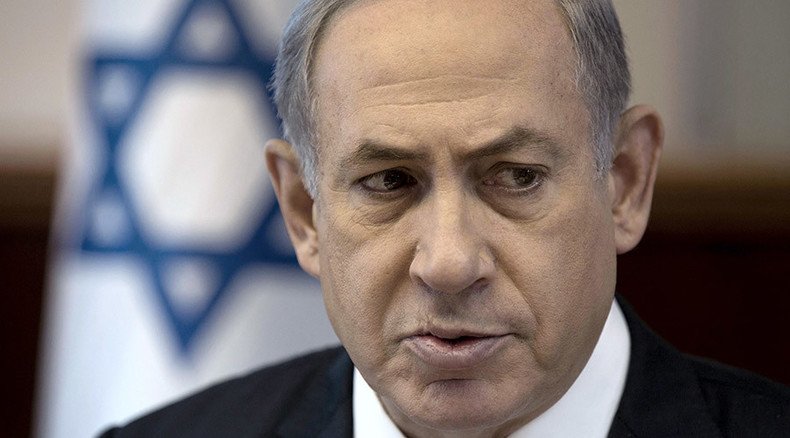Netanyahu says Israel not indifferent, but too small to host refugees

Israel is not unsympathetic to the refugees’ plight but it has no capacity to take in large numbers of people, the country’s Prime Minister Benjamin Netanyahu said as he rejected that idea of accepting refugees from the Middle East and Africa.
“Israel is a small country, very small country that lacks [the] demographic depth and geographic breadth” to absorb the influx of migrants, amounting to tens of thousands of people, Netanyahu told his Cabinet on Sunday.
“We must protect our borders against illegal immigrants and against the perpetrators of terrorism. We cannot allow Israel to be flooded with infiltrators,” he added, as quoted by the Times of Israel.
However, he also said that “Israel is not indifferent to human tragedy; we conscientiously handled a thousand [people] who were wounded in the fighting in Syria and we have helped them rebuild their lives.”
#Gaza water shortage catastrophic: ‘We can’t drink, cook or wash with it’ http://t.co/oOhWengh78pic.twitter.com/jqXxUjJNGc
— RT (@RT_com) September 6, 2015The opposition leader from the Zionist Union Isaac Herzog sharply criticized the prime minister’s speech at the Cabinet meeting accusing him of “forgetting what it is to be Jewish.”
“Refugees. Pursued. The prime minister of the Jewish state doesn’t close his heart nor his borders when people are escaping their pursuers, with their babies in their hands,” he said.
The prime minister’s comments came amid the growing debate within the Israeli political establishment concerning the refugee crisis.
On Saturday, Herzog suggested that Israel should take in the refugees from Syria calling it the country’s duty. The proposal followed a similar one that was earlier issued by the Palestinian Authority President Mahmoud Abbas and consisted of hosting the refugees in the West Bank.
#TRENDING: 100,000 people sign petition to arrest #Netanyahu during September talks in UK http://t.co/n9QocvJyTPpic.twitter.com/M8RfOEeD9v
— RT (@RT_com) September 6, 2015Herzog’s idea was supported by the Deputy Minister for Regional Affairs, Ayoub Kara, who called on the government to let thousands of migrants into the country. Ayoub Kara also described it as Israel’s moral duty, referring to suffering of the Jews during the of Holocaust.
At the same time, many government officials sided with the prime minister. The Justice Minister, Ayelet Shaked, also rejected any possibility of taking in the migrants as she told Israeli media that “the country gives humanitarian aid, but absorbing refugees will be done in Turkey or Jordan, but not in the State of Israel.”
Yariv Levin, the Tourism Minister, opposed the idea of accepting the migrants pointing at security concerns. “I suggest we stop with this custom of trying to find favor all the time. We must not take in people from an enemy state who could act against us from within Israel,” he told Army Radio.
'Take in one family of refugees', #PopeFrancis calls on very European parish http://t.co/Dxc7QBcUrOpic.twitter.com/WT4E1KDAV4
— RT (@RT_com) September 6, 2015The Transportation Minister, Yisrael Katz, called Herzog’s proposal “a lack of political wisdom and a lack of national responsibility”.
“At least he [Herzog] should suggest, as did the prime minister of Finland, to take them into his house,” Katz wrote on his Facebook page referring to the offer of the Finnish Prime Minister Juha Sipila to host refugees in his spare house.
During the Cabinet meeting, Benjamin Netanyahu also announced plans to immediately start constructing a fence along the country’s eastern border with Jordan.
“To the extent that it is possible we will encompass Israel’s borders with a security fence and barriers that will allow us to control our borders,” Netanyahu said as quoted by the Israel National News.
Cameron's refugee crisis plan: vote to strike ISIS in Syria & 15k refugees relocation http://t.co/1FqQjUCDsbpic.twitter.com/dIS90P0YOH
— RT UK (@RTUKnews) September 6, 2015“In the first phase we will build it from Timna to Eilat, to protect the airport being built there, and we will continue it to the Golan Heights, where a very strong security fence has already been built,” he added emphasizing that Israel would not be allowed to “be flooded with illegal immigrants, work-seekers and terrorist activists.”
This year the world is witnessing one of the worst refugee crises since WWII as millions of people are flee war and poverty in the Middle East and Africa.
LISTEN MORE:












